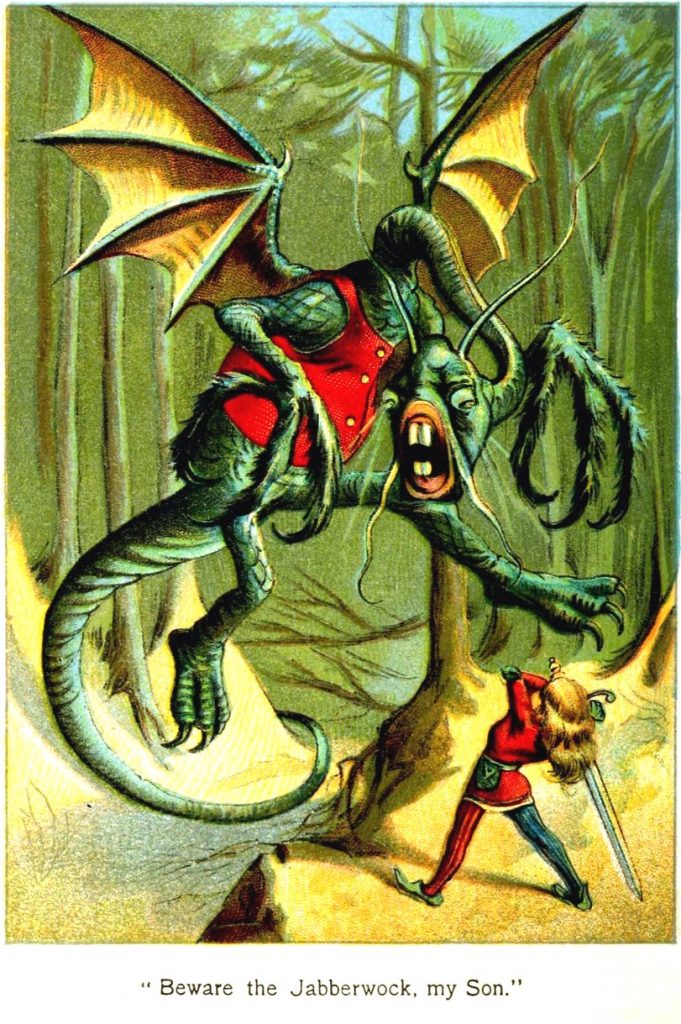
Note: If you wish to receive, via e-mail, (1) my weekly newsletter or (2) daily copies of these posts, notify me at [email protected] and indicate which you would like. I promise not to share your e-mail address with anyone. To unsubscribe, send me a follow-up email.
Thursday
Yesterday’s Washington Post had a moving story about a woman who used poetry to comfort a son that was dying from a rare form of cancer. One poem in particular, Lewis Carroll’s “Jabberwocky,” caught my eye. Josie Glausiusz says she recited it to her son as he lay comatose in her arms and only a few hours from death. It reminded me of the lullaby that I sang to the body of my own dead son after they had retrieved him from the river where he had drowned.
Glausiusz reports that her son knew the poem by heart because she had often recited it to him and his twin sister at bedtime. She notes that, as a “brave, bright, imaginative, optimistic boy, he loved the drama of the poem and the courage of the ‘beamish boy’ as, with his ‘vorpal sword’ in hand, he defeats his ‘manxome foe.’ (The full poem can be found at the end of today’s blog.)
“Jabberwocky” was not the only poem that Glausiusz read to her son:
One evening in the hospital in mid-February, I read him some of my favorite poems, poems that my own mother had read to me as a child. “Cargoes” by John Masefield (“Quinquireme of Nineveh from distant Ophir / Rowing home to haven in sunny Palestine …”) and a Shakespeare sonnet (“When, in disgrace with fortune and men’s eyes …”). He listened, rapt and smiling. Then we talked about the meaning of the poems.
Poetry consoled the mother as well, who said that poems offered her an anchor. During her son’s illness, she started a poetry group called “Poetry Is Medicine” on WhatsApp,” where she received and shared poems with friends. “With just a word or a phrase,” she discovered, “a poem can reach the hidden places that prayers or well-meaning advice cannot.”
Glausiusz also shares some of the poems that comforted her after her son died, including Luis Alberto de Cuenca’s “Moses.” I find a fascinating connection between it, “Jabberwocky,” and the lullaby I sang to my own son. Glausiusz says she read it aloud beside her son’s grave:
Moses
Luis Alberto de Cuenca
Trans. Gustavo Pérez Firmat
Give me your hand. We have to cross
the river and my strength fails me.
Hold me as if I were an abandoned package
in a wicker basket, a lump that moves
and cries in the twilight. Cross the river
with me. Even if this time the waters
don’t part before us. Even if this time God
doesn’t come to our aid and a flurry of arrows
riddles our backs. Even if there is no river.
“Jabberwocky” and “Moses” share a vision of venturing out into the unknown. Just as the speaker in Cuenca’s poem is prepared to enter the wilderness with a loved one, so the father in Carroll’s poem is watching his son enter a strange and forbidding landscape to confront the jabberwock:
’Twas brillig, and the slithy toves
Did gyre and gimble in the wabe:
All mimsy were the borogoves,
And the mome raths outgrabe.
“Beware the Jabberwock, my son!
The jaws that bite, the claws that catch!
Beware the Jubjub bird, and shun
The frumious Bandersnatch!”
Because of the anxieties, the joy is especially intense when the son safely returns. “Come to my arms, my beamish boy!” the father cries out. It is this drama of venturing out into the unknown, and then returning safely, that is at the heart of the lullaby I sang to my dead son. It was a song I had sung to him many times when he was little:
Baby’s boat’s a silver moon,
sailing through the sky,
Sailing through a sea of sleep
As the stars float by
Sleep, baby, sleep
Out upon that sea
Only don’t forget to sail
Back again to me.
Baby’s fishing for a dream
Fishing near and far
His line a silver moonbeam is
His bait’s a shining star
Sleep, baby, sleep
Out upon that sea
Only don’t forget to sail
Back again to me.
Our lives are shattered when our children venture out and don’t sail back. But maybe, just maybe, we will join hands again or enfold them in an embrace.
Here’s “Jabberwocky”:
’Twas brillig, and the slithy toves
Did gyre and gimble in the wabe:
All mimsy were the borogoves,
And the mome raths outgrabe.
“Beware the Jabberwock, my son!
The jaws that bite, the claws that catch!
Beware the Jubjub bird, and shun
The frumious Bandersnatch!”
He took his vorpal sword in hand;
Long time the manxome foe he sought—
So rested he by the Tumtum tree
And stood awhile in thought.
And, as in uffish thought he stood,
The Jabberwock, with eyes of flame,
Came whiffling through the tulgey wood,
And burbled as it came!
One, two! One, two! And through and through
The vorpal blade went snicker-snack!
He left it dead, and with its head
He went galumphing back.
“And hast thou slain the Jabberwock?
Come to my arms, my beamish boy!
O frabjous day! Callooh! Callay!”
He chortled in his joy.
’Twas brillig, and the slithy toves
Did gyre and gimble in the wabe:
All mimsy were the borogoves,
And the mome raths outgrabe.